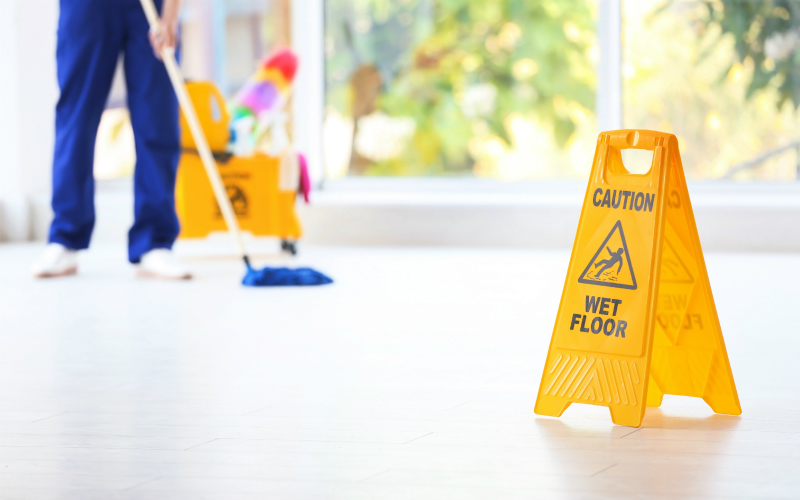
With the gloomy rainy days of late summer setting in, many establishments are looking out their wet floor signs and anti slip mats. Whilst organisations are under a duty to take reasonable care for people on their premises, many organisations may try and argue that those individuals are partially to blame for any accidents which occur, which is precisely what happened in the case of Pauline Sullivan v. Dunnes Stores UK Limited.
The case centred around Mrs Sullivan who was awarded over £40,000 after suffering injuries from a slip on a wet floor. On a rainy day in November 2015, Pauline Sullivan was making her way through Dunnes department store in Cumbernauld. As she made her way out of the store towards the car park, she walked across the tiled floor whilst looking in her bag for her car keys. The store had an anti slip mat placed at the door to prevent slipping accidents, however there was a gap between the doors and the mat. Consequently, when Mrs Sullivan stepped off the mat onto the wet tiled floor she slipped and fell, suffering severe injury to her knee. There were no wet floor signs or any kind of notification that the floor may have been wet. Following her fall, Mrs Sullivan required knee surgery, had time off work and required help from family and friends.
Dunnes accepted that the tiled floor could, to quote Bon Jovi, become “slippery when wet” and that they had failed to take the appropriate steps to avoid a slipping accident. However, they argued that it was reasonable to apportion an element of blame on Mrs Sullivan, suggesting that she was aware of the rain outside and her attention was focused on finding her car keys as opposed to watching for potential hazards. In other words, they were suggesting that her lack of attention had contributed to the accident. This is known as contributory negligence - that an injured person is partly to blame for the accident - and is an argument which regularly arises in personal injury claims involving slips, trips and falls.
Sheriff Braid rejected this argument. He found that there was nothing to alert Mrs Sullivan to any kind of moisture on the floor and whilst she may have been aware of the rain outside, “the pursuer’s momentary inadvertence did not cause her to fall, nor contribute to her slipping in any way.” He found Dunnes to be fully responsible for the accident and awarded Mrs Sullivan a total of £41,835.55 in compensation.
This is a welcome decision from the court, as cases involving slips and trips are often met with arguments such as these. It is comforting that the courts are taking a reasonable approach where defenders argue that victims should be held partially to blame for their accident.
If you have any questions about making a personal injury claim, please contact our specialist Personal Injury team on 0800 731 8434.
